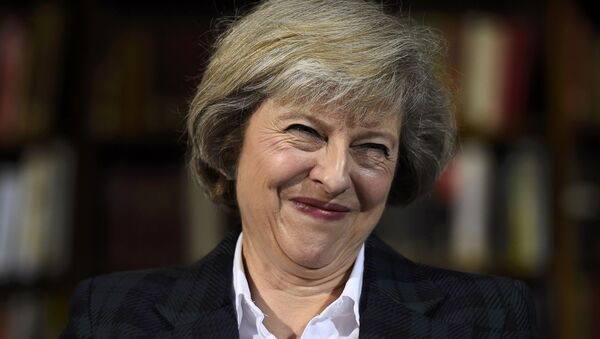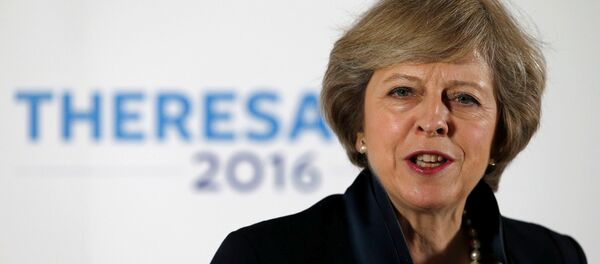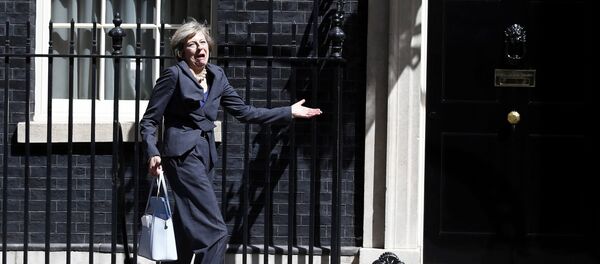Under the procedure, snap elections may take place in case two thirds of the UK Parliament vote to dissolve the legislature, or if the new government headed by the new Tory leader does not receive a vote of confidence within two weeks after it is formed.
"We on the left are now concentrating on demanding a general election as she, Theresa May herself did, when Gordon Brown succeeded Tony Blair to become the Prime Minister without the election," George Galloway, former member of the British Parliament told Sputnik.
Robert Oulds, the director of the Bruges Group, however, disagrees, claiming that the elections are the last thing the United Kingdom needs at the moment.
"If Theresa May wants to try and go for the election she would no doubt win decisively," Oulds told Sputnik, citing the crisis in the Labour Party and its inability to compete with the Conservatives.
"I am not convinced that Labour MPs [members of the parliament] would risk losing four years of salary and allowances and position of privilege," he added.
Is May Fit to Rule Brexit?
Oulds expressed hope that May would make the necessary changes and lead the United Kingdom out of the European Union, as even though she might not be the perfect candidate, every step would be scrutinized by think tanks such as the Bruges Group.
"We will watch very closely, and of course every stumbling will be punished," Oulds said.
At the same time, Galloway doubts May’s ability to lead as he does not believe her promises to make sure that London leaves the European Union.
"She doesn’t believe it. And I have no doubt that the Conservatives and the Labour majority in parliament are seeking to frustrate the decision of the referendum by a very British coup of kicking it as deep into the long grass as possible, and leaving the European Union with the least aspect of leaving, a bit like a divorce, in which you continue to live in the same house," Galloway said.
What Will Change After May Premiership?
In the context of the June 23 Brexit referendum, it is hard to find any other issue to occupy May as the new UK prime minister. But again, given the history of this politician, her approach is questioned. Galloway notes that what Britain needs is someone "with the imagination to grasp the new opportunities."
On the foreign policy flank, skills of the UK home-secretary-turned-prime-minister are yet again doubted. Oulds hopes that the major achievement of the Leave vote will be represented and the United Kingdom will become a beacon of hope for all other European countries who seek independence from Brussels.
"Hopefully the British interest will be the new foreign policy which will be looking to limit the extending power of the European Union," he said, underlining that while within the European Union, a country cannot diverge its foreign policy course from that of Brussels.
At the same time, Galloway is very much skeptical of the UK foreign policy course given that May "doesn't know anything about foreign policy."
"I think that for the moment she will continue to pursue pro-American, neo-Con, neo-Liberal approach of David Cameron," he concluded.
The Only Candidate
"There is something very House of Cards about the withdrawal of Andrea Leadsom, it does not add up. The reality is that she had a real fighting chance to win in the Tory membership, mainly over the EU issue," Galloway said.
Oulds also expressed his disappointment with Leadsom's withdrawal and stressed that she had every chance of winning.
"The withdrawal of Angela Leadsom from the leadership race is of course disappointing, because she was a confirmed Brexiteer, she campaigned for leaving the European Union, and it would actually be very helpful to have her presence," he said, emphasizing that having Leadsom as candidate would have allowed a debate in the Conservative Party about what direction to take Brexit.
On June 23, the United Kingdom held a referendum to determine whether or not the country should leave the European Union. According to the final results, 51.9 percent of voters, or 17.4 million people, decided to support Brexit, while about 16.1 million opposed it. London is now expected to invoke Article 50 of the EU Lisbon Treaty to initiate the formal process and start talks with the EU leaders on a new format of their relationship.
According to the Article 50, each EU member state can leave the bloc. Aiming to start the process of leaving the European Union, a member state must formally inform Brussels about its intention and, then, launch negotiations on abandoning the bloc. All EU treaties become rendered void when a final agreement is achieved or – if not – two years after the country’s notification.







